"He's very competitive, and doesn't like to be beaten," joked Mario Batara about his 20-year-old son Magnus Batara.
Slightly small in build and sitting quietly, Magnus is surrounded by a sea of gold and silver medals.
Focused, he methodically stacked and organized his prized possessions. But with one off-the-cuff comparison to swimming star Michael Phelps, his concentration broke and his face lit up at the compliment.
Magnus - who's being tipped to become a Paralympian at the 2016 Games, scored nine gold medals at last weekend's BC Summer Games Special Olympics in Surrey.
"It feels good," smiled the autistic Steveston-London graduate.
Magnus competed in the intellectual disability category for men's individual swimming. In most cases, he left his closest competitor about a metre behind, according to his father.
As a young child, Magnus' parents enrolled him in swimming lessons, but at that age, it was difficult to coach him. At 15, however, they tried again, And this time around, he excelled. Shortly after, he began training competitively.
"I feel like a fish in my aquarium," Magnus wrote in an email, as he communicates better through writing.
He can easily claim any pool as his turf and leave most in his wake, as he spends at least every afternoon between the waves.
Determined to compete in the 2016 Paralympics in Rio de Janeiro, Magnus also took a stab at qualifying for the 2012 London Games. Unfortunately, they only chose one male athlete in his category.
"My chance is Paralympics in 2016," Magnus wrote. "It's a long way to go, but it would be an honour. I will have to train really, really hard, having experienced how challenging it is to get into the Paralympic trials."
For the first time in a while at the London games, a category for intellectual disability was available, according to Mario.
"They started recognizing there was more of a demand for it," said Mario. "I think they had it before, but people were misrepresenting and cheating the system."
The intellectual disability category separates the athletes from those with a physical disability, but also recognizes the differences in training and coaching between them and able-bodied athletes.
"Athletes in the intellectual disability category lack the proper technique to compete with able-bodied swimmers, they aren't able to think about strategy," said Mario.
Besides keeping physically fit, being part of a swim club has helped develop Magnus' socialization skills, as his teammates tend to joke and play around during their off time.
Though he knows his way around the bottom of a pool, Magnus can generally find his way on dry land as well.
Constantly studying maps and directions, Magnus has a near photographic memory.
"He's like a personal GPS, very attracted to the visual stimulation," said Mario. "He's always on Google Maps."
Since 2007, Magnus has been in more than 10 national and international swim meets, travelling to places like Toronto, California and Liguria, Italy. Next on his list is the Canada Games.
"When you put the proper amount of training and effort into something like this, they can really exceed limitations," said Mario, proudly.



